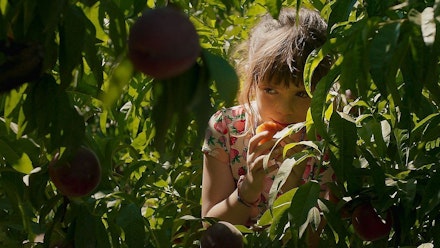Carla Simón’s gorgeous debut feature Summer 1993 followed an orphan child struggling to readjust to a new adoptive home. Her new film, lyrical and deceptively gentle, is about another painful transition. The family in Alcarràs is more settled and connected. Multiple generations live and work together on land they have called home for decades. However, when the legal owners of their sprawling peach farm sell the land to a company who will replace the trees with solar panels, the bonds that tie the family members together, and to the ground they cultivate, begin to fray.

It's a gorgeous farm: fruit the colour of sunsets nestling in verdant trees, all captured in Daniela Cajíias’s considered and often breathtaking cinematography. It looks like paradise, even if dipping fruit prices make it an impossibly tough living. Sadly, the family has no legal claim on the land because it was a gift given in return for a kindness during the Spanish Civil War. Grandfather Rogelio (Josep Abad) honours this connection, sharing figs with the heir to the estate, while the rest of the family make him an enemy.
The fascination that Simón finds in her story is in exploring the way each generation reacts differently to the intrusion of modernity on their time-capsule life. Just like the farm, the family is a delicately balanced ecosystem of intertwining needs and abilities. Those interloping solar panels throw everything off, just as a fault in the irrigation system turns the farmland to mud.
The loss is felt most keenly by head of the family Quimet, a man steeped in tradition and peach juice. His back twisted from hard graft, and a furrowed brow scarring his careful mask of geniality, Quimet is a hero who may not have another fight left in him. The star of this film, however, is boisterous youngster Iris (captivatingly played by Ainet Jounou), an imaginative child given to playacting games that mirror the adults’ real-life scenarios. As the digger encroaches to destroy the family’s livelihood, it steals her precious playground too.
